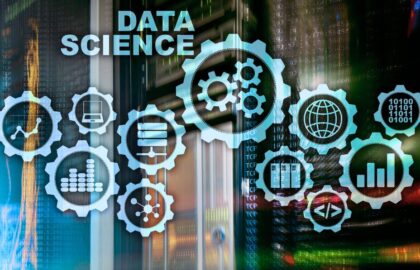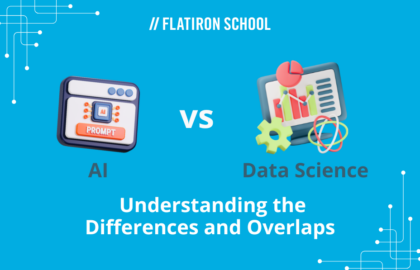Key takeaways
-
A data science bootcamp is an intensive, immersive program where you will learn the technical skills you need to become a data scientist.
-
A data science bootcamp is the most efficient way to learn data science skills. Many data science bootcamps can be completed in as little as 15 weeks.
-
The cost of a data science bootcamp will vary based on the program, but most are less than $20,000. While this may seem like a large investment, it's actually much less than the investment required for a college degree.
If you’re interested in the way data is used to inform the world around you and you’re looking to make a career change, a data science bootcamp can help you forge a new path forward.
A data science bootcamp is an immersive program where you are trained on the technical and soft skills necessary to become a data scientist through project-based learning.
With a bootcamp, you can hone in on a particular career path and graduate, job-ready in as little as 15 weeks. Bootcamps often include the opportunity to learn from knowledgeable instructors, a cohort of fellow career changers, and in some cases, a team of career coaches to help you land a job after graduation.
There are several ways you can become a data scientist, but a data science bootcamp is an efficient way to jumpstart your new career in the shortest time possible. Since bootcamps are usually shorter in length than other traditional education routes, they tend to prioritize learning the most relevant, up-to-date skills.
What is data science?

Data science is a discipline that combines knowledge from business, computer programming, math, and statistics to help companies uncover valuable insights from data.
Simply put, data science is the study of information. Most companies use it to help make business decisions, solve complex problems, and create strategies to improve results and performance. From understanding water use and air quality to create a more sustainable society to helping insurance companies mitigate risk, data science is important to every industry.
With a heightened focus on data, companies need professionals who are capable of understanding their business, analyzing the data, processing the results, and demonstrating their findings to stakeholders.
Data science bootcamps vs data science graduate degrees
Many students ask if you need an advanced degree to get a job in data science. It depends.
Getting a master’s degree in data science gives graduates the chance to learn more about specific topics, including math, statistics, and computer science. Many graduate degree programs provide full-time and part-time options for students. Some provide online access to make it easier for working professionals to obtain their graduate degrees.
While every data science graduate degree program has individualized requirements, they have some things in common. Many ask that applicants have degrees or related backgrounds in math, computer science, or statistics. You may need to provide letters of reference or samples of your work in data science as part of the admission process. Some schools require you to have done your GRE or GMAT in order to be considered.
A typical data science graduate program curriculum covers foundational science topics and subjects like data mining, data management, and machine learning.

The downside, of course, is the expense. The costs can vary for different graduate programs. For example, Carnegie Mellon University charges $26,500 per semester for a master’s degree, while Dartmouth University charges $19,625 per semester. Graduate school programs can last up to 2 years.
Bootcamps, on the other hand, typically cost less than $20,000 total, and can even be completed in as little as 15 weeks. That’s significantly less than the cost of many data science graduate degree programs and a fraction of the time. While it’s true that advanced degrees provide more time to dig deeper into particular topics, boot camps focus on the most pertinent skills to be a competent and competitive data professional in the market once you graduate.
Due to a shorter learning period in the bootcamp experience, students get an earlier start on pursuing a career in data science.
How to choose a data science bootcamp?
Career Karma and Course Report are two of the most trusted websites for finding and researching online bootcamps. These sites rank bootcamps on several factors and give awards each year for the best bootcamp in various categories.
Career Karma matches you with the top bootcamps that match your interest in data science. Once you get started, you’ll be matched with a coach who can help guide you in finding the right data science bootcamp for you. They will also help you come up with a career plan and walk you through the process of applying for a data science bootcamp, financing options, and the admissions process.
Course Report researches different data science bootcamps to help you pick and choose which one might fit your desired career goals. They provide written reviews about each bootcamp, along with webinars from students and instructors. It’s a great way to immerse yourself in the details of a data science bootcamp if you’re having trouble deciding.
Like Course Report, Switchup evaluates different bootcamps and rates them based on their ability to help students pursue their desired career goals. You can also find out information like:
-
Bootcamp financing options
-
Available courses
-
Which ones offer online courses
-
Length of the program
-
Reviews from bootcamp alums
How to prepare for a data science bootcamp?
If you’re serious about starting a data science bootcamp, you should do some prep work to get ready for the rigor of the bootcamp.
Things you can learn or study before you start a data science bootcamp:
-
Brush up on your math skills.
-
Try a free data science tutorial.
-
Set up your professional data science environment.
-
Practice for the admissions interview.
-
Read up on data science by exploring the industry.
Average Cost of Data Science Bootcamp
The costs for bootcamps can vary depending on the length or the pace of the program.
Like traditional universities and colleges, bootcamps offer scholarships, loans, and other financing options to ensure that money isn’t the reason you can’t access a quality education.
But don’t choose bootcamp simply based on which one is the cheapest. Higher priced bootcamps typically come with some added value.
For example, the curriculum at Flatiron School is developed with the workforce in mind, and is regularly reviewed by a panel of industry experts to ensure the curriculum is relevant to today’s workplace. Plus, 1:1 career coaching is included with the cost of tuition for 180 days after graduation.
Can data science bootcamps help you land a job?
If you’re a novice or familiar with the world of data science, you’ll want to ensure that the bootcamp you choose provides 1:1 career coaching — included in the cost of tuition — to support you through the job search.
Keep in mind, no bootcamp can guarantee that you’ll end up with a job as a data scientist. Even with career coaching, the work of getting a job is ultimately up to you.
Once you graduate and find a job, the learning doesn’t stop. This is a rapidly changing tech industry and the skills you learn at a bootcamp is just the beginning of the constant learning you will need to do to remain competitive.
What You Learn in a Data Science Bootcamp
You’ll learn the following data science skills and topics in a bootcamp:
-
SQL (Structured Query Language) — Used to extract data from relational databases
-
R and Python programming — Python and R libraries help data scientists get through cumbersome data tasks like data cleaning and machine learning more efficiently. The majority of data science bootcamps focus on Python programming since it comes equipped with code modules that can easily address machine learning, artificial intelligence, and analytics processes.
-
Artificial Intelligence — Simulates human behavior to help data scientists solve more complex problems.
-
Machine Learning — Uses data algorithms to help software applications predict more accurate outcomes.
-
Analytics — Relies on using math and statistics to find answers to business questions.
-
Data Modeling — Creating visual representations of a system or parts of it to illustrate how data points and structures connect.
-
Data Validation — Learning processes to check the accuracy of your results and the quality of the data used to obtain them.
-
Data Visualization — Illustrations of the insights gleaned from a data scientist’s research and analysis.
-
Hadoop — A software framework capable of storing and processing large data sets.
-
Spark — Analytics engine used for big-data processing.
What You’ll Need to Know as a Data Scientist
Data scientists rely on their coding skills to create and run the code required to build models. R and Python are two popular languages used by data scientists for that purpose. Jobs in data science typically require you to have strong quantitative knowledge of statistics and linear algebra.

Typically a data scientist’s role includes:
-
Collecting, cleaning, and explaining data
-
Translating business problems into workable data questions
-
Build predictive models
-
Program models and algorithms to gain valuable and actionable insight
One of the primary responsibilities for most data scientists will be to collect, preprocess and analyze large amounts of data. That means most of your days are spent cleaning and massaging data into a workable format. You’ll need to learn to work with tools like Tableau, GitHub, and Power BI to help you with these kinds of common data science tasks.

The skills you learn in a data science bootcamp can also prepare you for other data professional roles like data or business analysis.
Data or business analysts, which is a more beginner role compared to data scientist, scan and examine (analyze) data sets to identify trends and draw conclusions. They provide explanations and reports and show visualizations to illustrate insights. Data analysts are proficient in SQL and business intelligence software, which they use to interpret structured data and analyze the trends and patterns therein
You may also find yourself drawn more toward the field of data engineering. Data engineers assume responsibility for data pipelines relied upon by data scientists. They develop, maintain, deploy, and optimize the infrastructure used to transform data and share with data scientists and analysts.
How is the data science job market?

Despite the challenges that 2020 has had on the job market, the demand for data scientists has remained strong. Data science ranks in the top 3 of LinkedIn’s 2020 Emerging Jobs Report, expected to see a 37% annual growth in demand. Companies are relying heavily on data centered solutions to lower costs while increasing operational efficiency and are willing to invest in the talent.
This is one of the reasons why the big data market is expected to grow by 10.6% through 2025.
Being a data scientist can also be a lucrative career. The Bureau of Labor and Statistics (BLS) shows the median salary of data scientists and others in mathematical science occupations to be $103,930*. Glassdoor lists the average salary for data scientists at $115,114*.
Salaries of other data science positions per Glassdoor (current as of June 2021*):
-
Database Administrator: $81,439
-
Data Engineer: $111,138
-
Data Analyst: $67,998
Now that you know this is a lucrative career, how do you become a data scientist? There are a few ways into this career, from getting a master’s degree to the most efficient path – a data science bootcamp.
Sign up for data science bootcamp at Flatiron School
The Data Science bootcamp at Flatiron School can be completed in as little as 15 weeks for the full-time program, and the flexible pacing options can be completed in 20, 40, or 60 weeks.
Apply today or schedule a 10-minute chat with admissions to learn more about the program.




